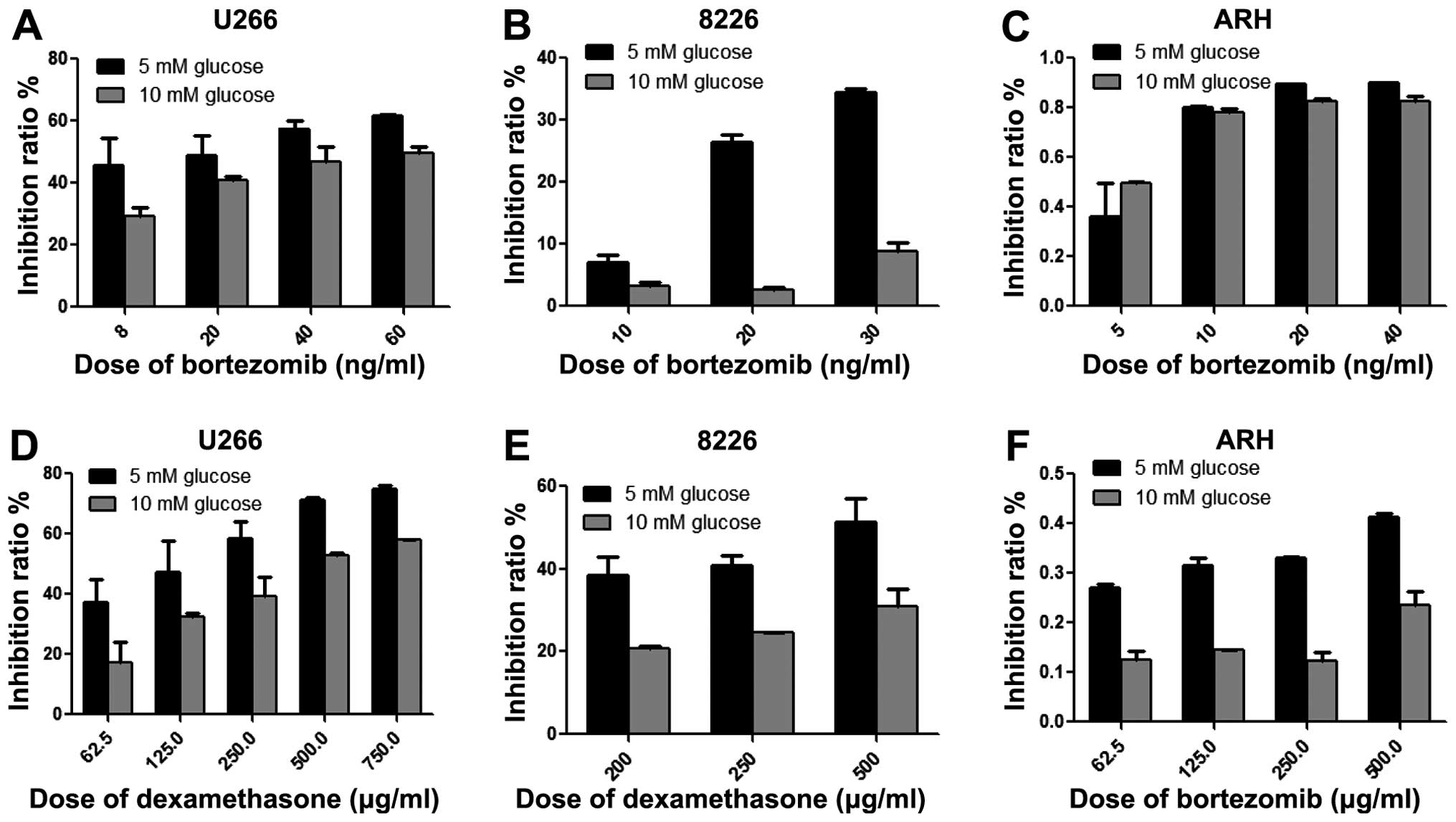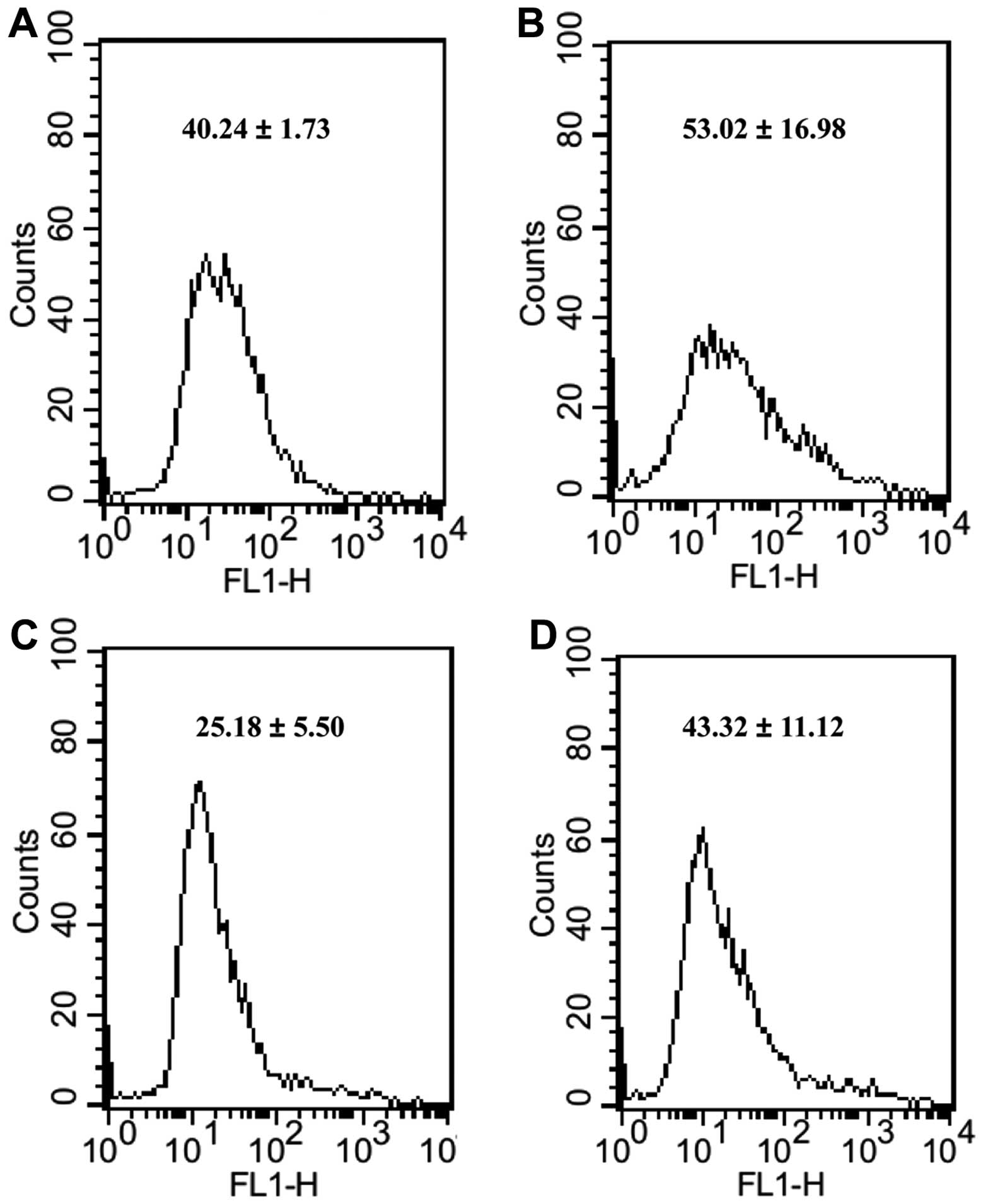|
1
|
Guglielmelli T and Palumbo A:
Incorporating novel agents in the management of elderly myeloma
patients. Curr Hematol Malig Rep. 8:261–269. 2013. View Article : Google Scholar : PubMed/NCBI
|
|
2
|
Palumbo A and Mina R: Management of older
adults with multiple myeloma. Blood Rev. 27:133–142. 2013.
View Article : Google Scholar : PubMed/NCBI
|
|
3
|
Chou YS, Yang CF, Chen HS, et al:
Pre-existing diabetes mellitus in patients with multiple myeloma.
Eur J Haematol. 89:320–327. 2012. View Article : Google Scholar : PubMed/NCBI
|
|
4
|
Issa ZA, Zantout MS and Azar ST: Multiple
myeloma and diabetes. ISRN Endocrinol. 2011:8150132011.
|
|
5
|
Jung SH, Jang HC, Lee SS, et al: The
impact of hyperglycemia on risk of severe infections during early
period of induction therapy in patients with newly diagnosed
multiple myeloma. Biomed Res Int. 2014:4131492014. View Article : Google Scholar : PubMed/NCBI
|
|
6
|
Ahmed YA and Eltayeb A: Clinical
challenges: myeloma and concomitant type 2 diabetes. Int J Hematol
Oncol Stem Cell Res. 7:34–41. 2013.
|
|
7
|
Wu W, Merriman K, Nabaah A, et al: The
association of diabetes and anti-diabetic medications with clinical
outcomes in multiple myeloma. Br J Cancer. 111:628–636. 2014.
View Article : Google Scholar : PubMed/NCBI
|
|
8
|
Chiu BC, Gapstur SM, Greenland P, Wang R
and Dyer A: Body mass index, abnormal glucose metabolism, and
mortality from hematopoietic cancer. Cancer Epidemiol Biomarkers
Prev. 15:2348–2354. 2006. View Article : Google Scholar : PubMed/NCBI
|
|
9
|
Baynes JW: Role of oxidative stress in
development of complications in diabetes. Diabetes. 40:405–412.
1991. View Article : Google Scholar : PubMed/NCBI
|
|
10
|
Busik JV, Mohr S and Grant MB:
Hyperglycemia-induced reactive oxygen species toxicity to
endothelial cells is dependent on paracrine mediators. Diabetes.
57:1952–1965. 2008. View Article : Google Scholar : PubMed/NCBI
|
|
11
|
Zorov DB, Juhaszova M and Sollott SJ:
Mitochondrial reactive oxygen species (ROS) and ROS-induced ROS
release. Physiol Rev. 94:909–950. 2014. View Article : Google Scholar : PubMed/NCBI
|
|
12
|
Edeas M: Strategies to target mitochondria
and oxidative stress by antioxidants: key points and perspectives.
Pharm Res. 28:2771–2779. 2011. View Article : Google Scholar : PubMed/NCBI
|
|
13
|
Vurusaner B, Poli G and Basaga H: Tumor
suppressor genes and ROS: complex networks of interactions. Free
Radic Biol Med. 52:7–18. 2012. View Article : Google Scholar
|
|
14
|
Valle I, Alvarez-Barrientos A, Arza E,
Lamas S and Monsalve M: PGC-1alpha regulates the mitochondrial
antioxidant defense system in vascular endothelial cells.
Cardiovasc Res. 66:562–573. 2005. View Article : Google Scholar : PubMed/NCBI
|
|
15
|
Nishikawa T, Edelstein D, Du XL, et al:
Normalizing mitochondrial superoxide production blocks three
pathways of hyperglycaemic damage. Nature. 404:787–790. 2000.
View Article : Google Scholar : PubMed/NCBI
|
|
16
|
Finck BN and Kelly DP: PGC-1 coactivators:
inducible regulators of energy metabolism in health and disease. J
Clin Invest. 116:615–622. 2006. View
Article : Google Scholar : PubMed/NCBI
|
|
17
|
Cao D, Zhou H, Zhao J, et al: PGC-1α
integrates glucose metabolism and angiogenesis in multiple myeloma
cells by regulating VEGF and GLUT-4. Oncol Rep. 31:1205–1210.
2014.PubMed/NCBI
|
|
18
|
St-Pierre J, Drori S, Uldry M, et al:
Suppression of reactive oxygen species and neurodegeneration by the
PGC-1 transcriptional coactivators. Cell. 127:397–408. 2006.
View Article : Google Scholar : PubMed/NCBI
|
|
19
|
Kong X, Wang R, Xue Y, et al: Sirtuin 3, a
new target of PGC-1 alpha, plays an important role in the
suppression of ROS and mitochondrial biogenesis. PLoS One.
5:e117072010. View Article : Google Scholar
|
|
20
|
Fujisawa K, Nishikawa T, Kukidome D, et
al: TZDs reduce mitochondrial ROS production and enhance
mitochondrial biogenesis. Biochem Biophys Res Commun. 379:43–48.
2009. View Article : Google Scholar
|
|
21
|
Zhang LN, Zhou HY, Fu YY, et al: Novel
small-molecule PGC-1α transcriptional regulator with beneficial
effects on diabetic db/db mice. Diabetes. 62:1297–1307. 2013.
View Article : Google Scholar :
|
|
22
|
Pearce EL, Walsh MC, Cejas PJ, et al:
Enhancing CD8 T-cell memory by modulating fatty acid metabolism.
Nature. 460:103–107. 2009. View Article : Google Scholar : PubMed/NCBI
|
|
23
|
Villarreal-Garza C, Shaw-Dulin R,
Lara-Medina F, et al: Impact of diabetes and hyperglycemia on
survival in advanced breast cancer patients. Exp Diabetes Res.
2012:7320272012. View Article : Google Scholar : PubMed/NCBI
|
|
24
|
Luo J, Chen YJ and Chang LJ: Fasting blood
glucose level and prognosis in non-small cell lung cancer (NSCLC)
patients. Lung Cancer. 76:242–247. 2012. View Article : Google Scholar
|
|
25
|
Friday E, Ledet J and Turturro F: Response
to dexamethasone is glucose-sensitive in multiple myeloma cell
lines. J Exp Clin Cancer Res. 30:812011. View Article : Google Scholar : PubMed/NCBI
|
|
26
|
Scarpulla RC, Vega RB and Kelly DP:
Transcriptional integration of mitochondrial biogenesis. Trends
Endocrinol Metab. 23:459–466. 2012. View Article : Google Scholar : PubMed/NCBI
|
|
27
|
Sheean PM, Kilkus JM, Liu D, Maciejewski J
and Braunschweig CA: Incident hyperglycemia, parenteral nutrition
administration and adverse outcomes in patients with myeloma
admitted for initial auto-SCT. Bone Marrow Transplant.
48:1117–1122. 2013. View Article : Google Scholar : PubMed/NCBI
|
|
28
|
McBrayer SK, Cheng JC, Singhal S, Krett
NL, Rosen ST and Shanmugam M: Multiple myeloma exhibits novel
dependence on GLUT4, GLUT8, and GLUT11: implications for glucose
transporter-directed therapy. Blood. 119:4686–4697. 2012.
View Article : Google Scholar : PubMed/NCBI
|
|
29
|
Zhao Y, Butler EB and Tan M: Targeting
cellular metabolism to improve cancer therapeutics. Cell Death Dis.
4:e5322013. View Article : Google Scholar : PubMed/NCBI
|
|
30
|
Gitenay D, Wiel C, Lallet-Daher H, et al:
Glucose metabolism and hexosamine pathway regulate oncogene-induced
senescence. Cell Death Dis. 5:e10892014. View Article : Google Scholar : PubMed/NCBI
|
|
31
|
Zhao Y, Liu H, Riker AI, et al: Emerging
metabolic targets in cancer therapy. Front Biosci (Landmark Ed).
16:1844–1860. 2011. View
Article : Google Scholar
|
|
32
|
DeBerardinis RJ, Mancuso A, Daikhin E, et
al: Beyond aerobic glycolysis: transformed cells can engage in
glutamine metabolism that exceeds the requirement for protein and
nucleotide synthesis. Proc Natl Acad Sci USA. 104:19345–19350.
2007. View Article : Google Scholar : PubMed/NCBI
|
|
33
|
Zhao Y, Altman BJ, Coloff JL, et al:
Glycogen synthase kinase 3alpha and 3beta mediate a
glucose-sensitive antiapoptotic signaling pathway to stabilize
Mcl-1. Mol Cell Biol. 27:4328–4339. 2007. View Article : Google Scholar : PubMed/NCBI
|
|
34
|
Danial NN, Gramm CF, Scorrano L, et al:
BAD and glucokinase reside in a mitochondrial complex that
integrates glycolysis and apoptosis. Nature. 424:952–956. 2003.
View Article : Google Scholar : PubMed/NCBI
|
|
35
|
Rathmell JC, Fox CJ, Plas DR, Hammerman
PS, Cinalli RM and Thompson CB: Akt-directed glucose metabolism can
prevent Bax conformation change and promote growth
factor-independent survival. Mol Cell Biol. 23:7315–7328. 2003.
View Article : Google Scholar : PubMed/NCBI
|
|
36
|
Mathupala SP, Ko YH and Pedersen PL:
Hexokinase II: cancer’s double-edged sword acting as both
facilitator and gatekeeper of malignancy when bound to
mitochondria. Oncogene. 25:4777–4786. 2006. View Article : Google Scholar : PubMed/NCBI
|
|
37
|
Gendron MC, Schrantz N, Metivier D, et al:
Oxidation of pyridine nucleotides during Fas- and ceramide-induced
apoptosis in Jurkat cells: correlation with changes in
mitochondria, glutathione depletion, intracellular acidification
and caspase 3 activation. Biochem J. 353:357–367. 2001. View Article : Google Scholar : PubMed/NCBI
|
|
38
|
Vu K, Busaidy N, Cabanillas ME, et al: A
randomized controlled trial of an intensive insulin regimen in
patients with hyperglycemic acute lymphoblastic leukemia. Clin
Lymphoma Myeloma Leuk. 12:355–362. 2012. View Article : Google Scholar : PubMed/NCBI
|
|
39
|
Puigserver P, Wu Z, Park CW, Graves R,
Wright M and Spiegelman BM: A cold-inducible coactivator of nuclear
receptors linked to adaptive thermogenesis. Cell. 92:829–839. 1998.
View Article : Google Scholar : PubMed/NCBI
|
|
40
|
Kang C and Li Ji L: Role of PGC-1α
signaling in skeletal muscle health and disease. Ann NY Acad Sci.
1271:110–117. 2012. View Article : Google Scholar
|
|
41
|
Radak Z, Zhao Z, Koltai E, Ohno H and
Atalay M: Oxygen consumption and usage during physical exercise:
the balance between oxidative stress and ROS-dependent adaptive
signaling. Antioxid Redox Signal. 18:1208–1246. 2013. View Article : Google Scholar :
|
|
42
|
Wenz T: Regulation of mitochondrial
biogenesis and PGC-1α under cellular stress. Mitochondrion.
13:134–142. 2013. View Article : Google Scholar : PubMed/NCBI
|
|
43
|
Salem AF, Whitaker-Menezes D, Howell A,
Sotgia F and Lisanti MP: Mitochondrial biogenesis in epithelial
cancer cells promotes breast cancer tumor growth and confers
autophagy resistance. Cell Cycle. 11:4174–4180. 2012. View Article : Google Scholar : PubMed/NCBI
|
|
44
|
Tennakoon JB, Shi Y, Han JJ, et al:
Androgens regulate prostate cancer cell growth via an
AMPK-PGC-1α-mediated metabolic switch. Oncogene. 33:5251–5261.
2014. View Article : Google Scholar
|
|
45
|
Girnun GD: The diverse role of the PPARγ
coactivator 1 family of transcriptional coactivators in cancer.
Semin Cell Dev Biol. 23:381–388. 2012. View Article : Google Scholar : PubMed/NCBI
|




















